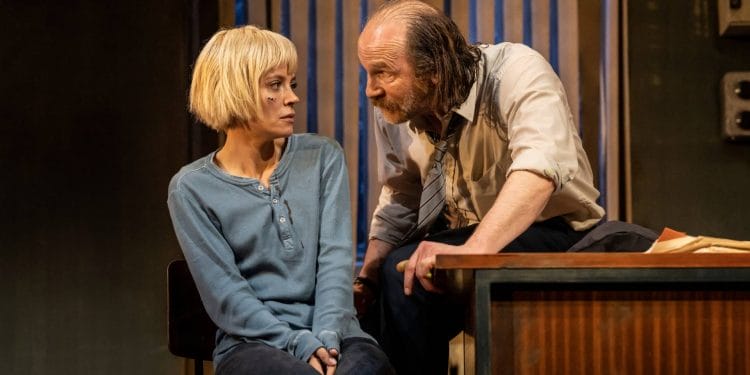 It’s been two decades since Martin McDonagh’s The Pillowman premiered in London, and has subsequently been performed all over the world, except in the West End. Following a pandemic delay, it’s revived under the direction of Matthew Dunster at the Duke of York’s Theatre in a startingly brilliant production that feels all the more relevant twenty years after it was first performed.
It’s been two decades since Martin McDonagh’s The Pillowman premiered in London, and has subsequently been performed all over the world, except in the West End. Following a pandemic delay, it’s revived under the direction of Matthew Dunster at the Duke of York’s Theatre in a startingly brilliant production that feels all the more relevant twenty years after it was first performed.
When it was first written, McDonagh may have been seeking to highlight the power of literature, but in the wake of events like the Roald Dahl revision controversy, The Pillowman now feels like even more of a call to defend and preserve literature.
In a totalitarian police state, Katurian, a writer of short stories, has been taken into police custody. Tupolski and Ariel play the good cop/bad cop routine but Katurian is convinced she hasn’t done anything wrong. Some of her gruesome fairytales depict the torture and death of children, and these terrible acts are now being carried out for real.
With her brother, Michal (Matthew Tennyson) in a cell next door, Katurian faces the choice of saving herself, her brother or her stories. It becomes a remarkably easy choice. McDonagh’s dark but wildly funny play masterfully meshes reality and fiction, Katurian’s story ‘The Writer and the Writer’s Brother’ tells the story of their own childhood, but revises the ending to cover up another crime.
Then there’s ‘The Little Apple Men’ and ‘The Tale of the Town on the River’, both stories are told on stage but merge with the reality of the play as they were used in the killings. ‘The Little Jesus’ is reenacted on stage in order to set up thee next scene, but just like Katurian in the interrogation room, we can never really trust that what we are being told is true.
For this production of The Pillowman, the role of Katurian is gender swapped, here played in superb style by Lily Allen. To see Ariel beat and torture a woman makes these scenes all the more shocking, while the childhood backstory also makes more sense. Allen is commanding in the role, particularly in the scenes where Katurian surreptitiously gets the upper hand on her captors.
Steve Pemberton revels in the dark comedy, and when the good cop/bad cop set up is reversed he is chillingly evil. This is in contrast to Paul Kaye’s maniacal Ariel, who subtly portrays the nuance of the character; a man who has been abused as a child himself, and while fundamentally corrupt, believes he’s doing it all for the right reasons.
Just as The Pillowman seeks to defend literature, the play itself contains language and references that would struggle to be accepted if it were written today. Ableist slurs and racial stereotyping sit uncomfortably in this otherwise gripping drama.
Anna Fleischle’s grand set slides in and out, thus drawing the audience ever deeper in to these twisted tales, while the use of projections gives contrast to the bleak police interview room. While the four leads occupy most of the stage time, there is a wider cast, including two children (Madelynne Mills and Darcy Crosby on press night) and a brief but brilliant appearance from David Angland as the Blind Man.
Matthew Dunster’s production of The Pillowman, is a masterpiece of dark comedy. It may not always be an easy watch but it serves up a delicious take on what it means to be a writer, and to believe in your own abilities above all else.

















